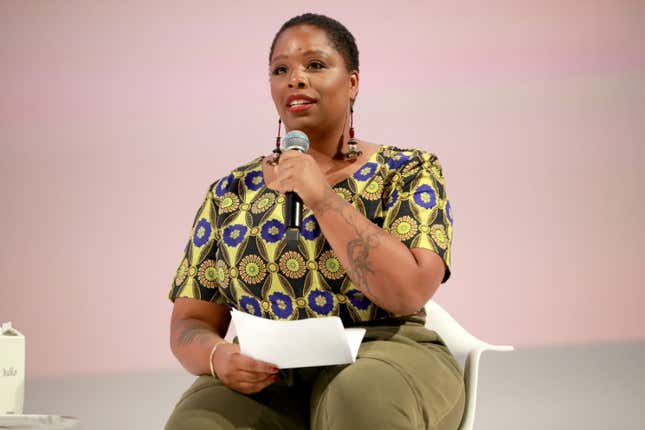
Black Lives Matter has become such a mainstream rallying cry and concept that it’s easy to forget it’s also an organization—and one that has grown from a grassroots movement to a global network aimed at the betterment of the Black collective. Since the BLM explosion over the summer, the organization has been making some serious moves. BLM co-founder and four-time The Root 100 honoree Patrisse Cullors announced the launch of a BLM political action committee in October; penned a letter to President-elect Joe Biden and Vice President-elect Kamala Harris requesting an audience to discuss the incoming administration’s commitment to Black people; and on Wednesday, she spoke with The Root about her deal with Warner Bros. TV Group to “develop and produce original programming for all platforms including streaming services, cable, and the five broadcast networks.”
But like any other global organization, BLM isn’t immune to internal conflict, and Cullors and the BLM Global Network have drawn plenty of criticism from a number of local chapters that say they’ve been locked out of the decision-making process by those higher up on the chain.
In an open letter, ten BLM chapters aired out a range of grievances over leadership’s lack of transparency and the exclusion of local chapters from input-giving processes. The statement was released last week, according to Politico.
“We became chapters of Black Lives Matter as radical Black organizers embracing a collective vision for Black people engaging in the protracted struggle for our lives against police terrorism,” the statement read. “With a willingness to do hard work that would put us at risk, we expected that the central organizational entity, most recently referred to as the Black Lives Matter Global Network (BLMGN) Foundation, would support us chapters in our efforts to build communally. Since the establishment of BLMGN, our chapters have consistently raised concerns about financial transparency, decision making, and accountability.”
The statement claims that “no acceptable internal process of accountability has ever been produced by BLMGN,” and listed six specific complaints:
- Patrisse Cullors, as the sole board member of BLMGN, became Executive Director against the will of most chapters and without their knowledge.
- The newly announced formation, BLM Grassroots, does not have the support of and was created without consultation with the vast majority of chapters.
- The formation of BLM Grassroots effectively separated the majority of chapters from BLMGN without their consent and interrupted the active process of accountability that was being established by those chapters.
- In our experience, chapter organizers have been consistently prevented from establishing financial transparency, collective decision making, or collaboration on political analysis and vision within BLMGN
- For years there has been inquiry regarding the financial operations of BLMGN and no acceptable process of either public or internal transparency about the unknown millions of dollars donated to BLMGN, which has certainly increased during this time of pandemic and rebellion.
- To the best of our knowledge, most chapters have received little to no financial support from BLMGN since the launch in 2013. It was only in the last few months that selected chapters appear to have been invited to apply for a $500,000 grant created with resources generated because of the organizing labor of chapters.
Sheri Dickerson, lead organizer with Black Lives Matter Oklahoma City—one of the ten chapters behind the statement—told Politico that “intentional erasure” has plagued BLM local activists for some time.
“People assume that that money is distributed to local chapters,” Dickerson said. “That is not the case. People also assume that when actions are made, that national [leadership] has the support and agreement from this collective that what they’re saying is representative of us. And that’s certainly not the case.”
The statement by the ten chapters encouraged BLM supporters to donate funds directly to local groups instead of the global network.
We reached out to Cullors for a comment and will update this story if and when she responds.
Updated: 12/10/2020, 1:45 p.m. ET:
BLM Global Network Foundation, BLM Grassroots, and BLM PAC provided the following statement to The Root:
We will be releasing our annual report outlining the financial activities of the foundation, and we are in compliance with all legal requirements.
In 2013, #BlackLivesMatter (BLM) began as a hashtag and online community. We expanded into the Black Lives Matter Global Network Foundation, a fiscally sponsored organization, in 2015. Our organization has supported the largest social movement in the world. Due to the significant growth experienced over the last 7 years, BLM affiliated chapters are now under the BLM Grassroots umbrella, a separate entity that provides official chapters with the flexibility needed to engage in rapid response work, grassroots power building, and transformative justice grounded in abolitionist principals, which are at the core of our movement. This group houses our movements’ organizing work so that BLMGNF can remain a fundraising body, amplifier, and action-oriented think tank for Black-led organizations.
Chapters that are a part of BLM Grassroots joined a unity pledge that laid out a set of organizing principles. Of the chapters who signed on to the open letter published Nov. 30, four were previously affiliated with BLMGNF but declined to join the new BLM Grassroots entity. Others listed in the letter were never affiliated chapters of BLMGNF nor BLM Grassroots. While this is important context, regardless of their affiliation, we know these groups will continue to do good and necessary work in their communities. We remain excited about the burgeoning BLM Grassroots, which has heard from over 300 cities interested in affiliating.
The Philadelphia, Chicago, Denver and Washington D.C. BLM chapters are the four out of the ten chapters that were previously affiliated with BLMGNF, according to the organization.
As for the controversy behind Cullors’ appointment as Executive Director of BLMGNF, The Root was referred to an op-ed piece Cullors wrote in September addressing the internal conflict.

